 Movies and TV
Movies and TV  Movies and TV
Movies and TV  History
History 10 Extreme Laws That Tried to Engineer Society
 History
History 10 “Modern” Problems with Surprising Historical Analogs
 Health
Health 10 Everyday Activities That Secretly Alter Consciousness
 History
History Top 10 Historical Disasters Caused by Someone Calling in Sick
 Animals
Animals 10 New Shark Secrets That Recently Dropped
 Movies and TV
Movies and TV 10 Forgotten Realities of Early Live Television Broadcasts
 Technology
Technology 10 Stopgap Technologies That Became Industry Standards
 Weird Stuff
Weird Stuff 10 Wild Facts About Taxidermy That You Probably Didn’t Know
 Travel
Travel 10 Beautiful Travel Destinations (That Will Kill You)
 Movies and TV
Movies and TV 10 Box Office Bombs That We Should Have Predicted in 2025
 History
History 10 Extreme Laws That Tried to Engineer Society
 History
History 10 “Modern” Problems with Surprising Historical Analogs
Who's Behind Listverse?

Jamie Frater
Head Editor
Jamie founded Listverse due to an insatiable desire to share fascinating, obscure, and bizarre facts. He has been a guest speaker on numerous national radio and television stations and is a five time published author.
More About Us Health
Health 10 Everyday Activities That Secretly Alter Consciousness
 History
History Top 10 Historical Disasters Caused by Someone Calling in Sick
 Animals
Animals 10 New Shark Secrets That Recently Dropped
 Movies and TV
Movies and TV 10 Forgotten Realities of Early Live Television Broadcasts
 Technology
Technology 10 Stopgap Technologies That Became Industry Standards
 Weird Stuff
Weird Stuff 10 Wild Facts About Taxidermy That You Probably Didn’t Know
 Travel
Travel 10 Beautiful Travel Destinations (That Will Kill You)
Top 10 Murderers You Secretly Love
WARNING: spoilers. Murder is bad, wicked, evil. Most people would agree that it’s the very worst thing a human-being can do. We condemn murderers in the press, but at the same time we obsess over knowing every tiny detail. We want to know why, where, who, how: how they did it, how they became so alienated from regular functioning society, how they feel after. There’s an obsession with murder and murderers that mirrors our obsession with celebrities.
Below I have collected the top ten movies that had murderers who were sick, vile and twisted, yes, but also endearing. Murderers who we rooted for to live past the end of the movie, escape or beat the lame hero. Whether it was their charisma, the redemption they found, revenge, the message implicit in the murders or the reasons behind them, these ten murderers (all men), while we might not invite them over for dinner with our family (except for possibly # 7), all have a special place in our hearts.
Note: There are only two qualifications. The movie has to have been made in the last twenty years (since 1990), and the person in the movie has to have killed more than one person (whether on screen or implied in the time-frame of the movie).
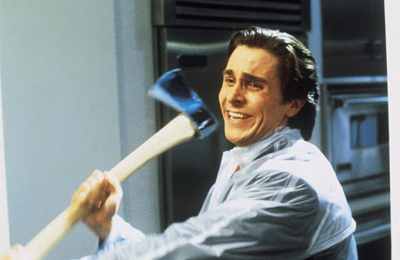
Bateman is a unique psychopathic serial killer. He’s unbelievably handsome, fit, rich, narcissistic, and he listens to Phil Collins. The shallow, ornamental, material-based society Bateman inhabits is starting to drive him insane. The creepy, self-narrated scenes where Bateman describes his mind unraveling, while he’s doing 2,000 + sit-ups, lying in a tanning bed, or putting on kiwi facial masks more expensive than most people’s cars, are beyond disturbing.
The reason Bateman is on this list, beyond being a nerdy, yuppie serial killer, which admittedly is kind of cool, is that somehow,at some point in the movie, we begin to feel sorry for this shallow, egotistical monster, who has everything we could ever dream of.
Because, as the audience, we are given access to the lives of these rich-boy yuppies we see that their internal lives are empty. Everything’s an ornament: business cards and attractive blonde fiancés are just won to compare with the business cards and attractive blonde fiancés of other yuppies. We see that, maybe, climbing and spending lead only to more climbing and spending. Bateman’s character only evokes pity. While he does have a certain unique sense of cool, ultimately we just feel sorry for the poor demented bastard.
During one of the final scenes of the movie, where Bateman sobbingly confesses to his lawyer on the phone, (“I guess I’ve killed twenty people….maybe forty” “I ate some of their brains, and I tried to cook a little.”) we feel how scared he really is—for his sanity, for his freedom, for being revealed for who he really is. This is how Dostoevsky portrayed a person who has just committed murder in Crime and Punishment—scared, guilty, ashamed, alone, and I imagine this is how it really feels.
From the final monologue of the movie: “There is no catharsis. My punishment continues to elude me. And I gain no deeper knowledge of myself. No new knowledge can be extracted from my telling. This confession has meant nothing.”
Note: I know some of you will say that the murders never even occurred—that it was all in Bateman’s head. But you’re wrong. You’re dead wrong.
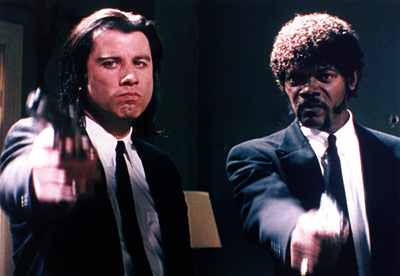
One of Quentin Tarantino’s greatest strengths is his ability to combine the ultra-violent with the everyday. This is why Pulp Fiction was so original and accessible to almost everyone who watched it. There’s murder and violence and obscenities, but there’s also Seinfeldish discussions about the most mundane topics. That these hit men might talk about the same things we talk about with our friends is surreal, and just really freaking cool. Not to mention that all the characters above are all three-dimensional and accessible. They’re bad people, but they’re not just bad people. They can be charming and worrisome and kind people, as well. Tarantino makes them human.
All three of these guys are ultimate bad-asses. They take crap from absolutely no one. Ving Rhames and Bruce Willis’s characters get the nod for their scene in that awful pawn shop together, where they were about to murder each other and instead bond with a shared decency and the disgust they both have for sexual deviants. As much as they might dislike each other—they respect each other. They might be killers, but they’re not perverted sickos.
Samuel L. Jackson gets the nod for the redemption he found. He feels like God intervened in his life and, not willing to ignore it or pass it off as coincidence, he decides to change his murdering ways. “I’m trying real hard here, Ringo.” And, though we never see what happens to him, we do witness what happens to his partner (John Travolta), who did pass the intervention off as a coincidence. Jackson’s character is the only one on this list who changed his ways. Because of that he deserves our respect, and is possibly even more bad-ass because of it.

The movie Se7ven is disturbing, frightening, dark and melancholy. And the scope of what John Doe does is jaw-dropping. A lot of serial killers brag about numbers, or trophies, or the pain they’ve caused. A lot of serial killers kill for no reason except to cause pain, but they have no vision beyond the murders; they are ends in themselves. But all of John Doe’s murders (even his own) were means to an end.
His immense scope and patience and time-in would be respectable if, say, he were doing research on cancer, or studying ancient cultures, but he’s a killer. Not just a killer—a monster. The most sadistic, depraved, frightening, intelligent monster ever shot on screen. What Hannibal Lecter did was peanuts compared to John Doe. While he only committed six murders, and never once on screen, and appeared in the film for only fifteen or twenty minutes he still remains one of the grittiest, most visceral sadists every conceived.
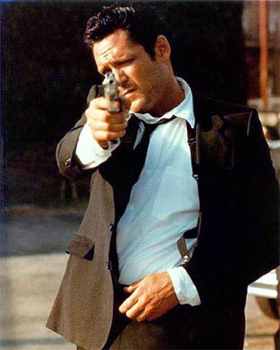
Vic Vega is the smoothest, most reserved psychopath ever shot on camera. Before he ever comes on screen, Mr. White and Mr. Pink create a myth of his actions in the foiled bank robbery. They imply that he’s an unhinged, psycho-deviant, without any self-control. But, when he finally arrives at the warehouse sipping soda out of a straw (what is Tarantino’s deal with food and violence), he’s the epitome of cool and calm. He stands up to the most bad-ass actor of all time: Harvey Keitel. “Are you gonna bark all day, little doggy, or are you gonna bite?”
He’s in bewilderment that Mr. White and Mr. Pink are giving him a hard time for assassinating a few expendable hostages. His calm presence makes Mr. White and Mr. Pink look like two little school-girls at their first dance. On reflection, Mr. Blonde makes every other person in this entire movie look like whiny little school-girls (besides, maybe, Joe the ringleader of the whole thing, and his son).
We feel bad for the cop getting his ear cut off—for his family—for staring into the face of a real-life psychopath, who couldn’t care less if he knows anything—just wants to torture him because he enjoys it, but damnit, it’s still one of the coolest scenes in all of cinema. Thank you Mr. Blonde.
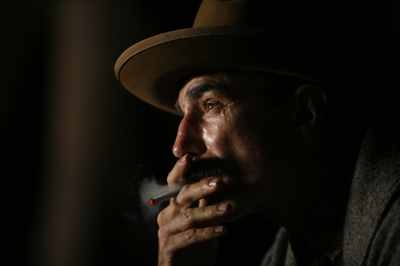
As the title of the movie suggests, there was blood, and it was Daniel Plainview who spilt it. He’s a self-proclaimed oil man, with a menacing mustache, dark beady eyes and a stubborn limp—he drags around his leg as if it were an albatross he’s been cursed to carry. He’s stubborn and impatient; he’s an alcoholic, a self-made millionaire and father to his creepy little son. And he murders exactly two people in this movie. The first, a vagabond who made the mistake of impersonating his brother, and the second the whiny, creepy preacher, Eli Sunday, who is the only character in the movie as unhappy and misguided as Plainview.
Plainview works his whole life to build an empire, and then when he’s sitting on it he has no idea what to do with himself. He uses everything at his disposal to advance himself, but what he’s really doing is taking steps backwards, toward depravity.
He is on this list, because he’s empathetic. A lot of people really do just care about themselves. A lot of people in the world really are not good people. He hates other people, but he genuinely wants one person to whom he can relate. His son is this person, until he goes deaf in a drilling accident, and becomes unreachable to someone as impatient as Plainview. He then meets someone he believes to be his long-lost brother, and he opens up—let’s himself be vulnerable, until he finds out that it’s not his brother at all—just some drifter who wanted to cash in on his fortune. He murders him, and tries to reconnect with his son, but it’s too late.
He’s lost. He becomes exceptionally lonely, and drowns himself in decadence and alcohol in his mansion. Then he murders Eli Sunday, because he’s a slimy little weasel, yes, and he has nothing to live for, but, fundamentally, because he sees himself in Sunday. And he hates himself more than anything else in the entire world.
Note: The abruptness and finality of Eli’s murder in this movie is shocking, and unexpected. It really can be that easy to murder someone. It really can just happen when we least expect it.
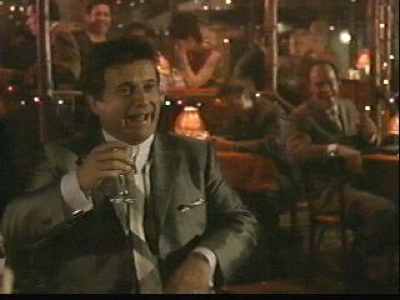
Coming in at around 5’4’’, Joe Pesci plays the ultimate bad-ass in this Scorsese film. Whether he’s stabbing someone in the chest with a pen or shooting an innocent waiter to death for a mild insult, nobody ever willingly crosses Tommy Devito. He’s ruthless, dangerous, prone to violent outbursts, has severe anger issues and can kill people who cross him with any object that happens to be lying around. Basically he’s a psychotic, murderous Mafioso.
But he still functions. He has beautiful girlfriends, and cool friends, and he’s rich. Not to mention, he’s entertaining as hell to watch. He’s somebody who would be cool to hang out with, if there wasn’t a substantial chance he would stab you to death in the face. He kills because he enjoys it. But at least he’s honest.
More than any other person on this list, Tommy possesses undeniable charisma. After murdering a made guy by stabbing him in the chest with a pen, and then later a knife in his trunk, he goes and eats pasta at his sweet mother’s house with his friends, laughing and drinking like nothing happened. The scariest thing about Tommy is that he might not even be insane. He just doesn’t care. He’ll shoot you, or stab your sister, for one slip of tact. But he’s still a funny guy. (“What do you mean I’m funny? What like a clown? What I’m a clown?”)
Even though he got what was coming to him in the end, and was extremely unstable, we all still kind of wished that Tommy was getting made in his last scene instead of getting whacked.
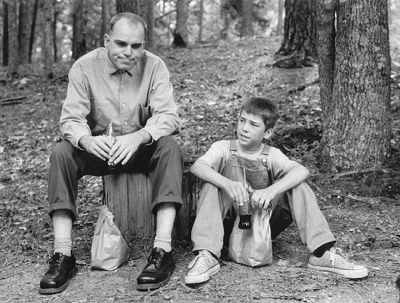
Another unforgettable movie. While most of the characters on this list are cold-blooded murders, without any morals or empathy, Karl Childers is not one of them (even though he does eat his dinner of french fried ‘petaters’ on a table not three meters from where he just clobbered someone over the head with a lawnmower blade).
In Billy Bob Thornton’s directorial debut, Karl Childers is a semi-retarded inmate being let go from a mental hospital in the South, decades after killing his mother with a sling blade (some people call it a Kaiser blade). Days later he befriends a slow, father-less young boy, who quickly convinces his loving, but submissive, mother to let Karl live in their garage. This sounds like a simple movie, and inherently it is, but it remains one of the sweetest, most uplifting, most genuine movies ever made. Thorton’s character has been the butt of countless jokes, impersonations and even a mock movie, but he rode it all the way to the upper echelons of Hollywood.
There is no doubt in my mind that Karl is the most harmless character to ever murder two people using long, sharp objects. He’s sweet, and has the mental capacity of his slow 12-year-old friend, and so cannot be anything but honest about what he sees, does, witnesses…etc. Before murdering the abusive step-father character, Doyle (portrayed exceptionally well by country singer Dwight Yokam), with a lawnmower blade, he asks him what numbers to dial for the police. Then when Doyle asks him why he wants to know he says, “I reckon I’m gonna kill you with this here lawnmower blade.”
That last scene pretty much sums up the entire mood of the movie. A simpleton, abused by his parents, who sees the same thing happening to the boy he loves more than the world itself, and who will not allow it. This movie would be funny, if it wasn’t so heart-wrenching, to watch this simple, kind man let out into a world that’s too big for him to comprehend.
Note: Dwight Yokam’s character, Doyle, would also definitely earn a spot on the top ten people in a movie that you want to get brutally murdered.
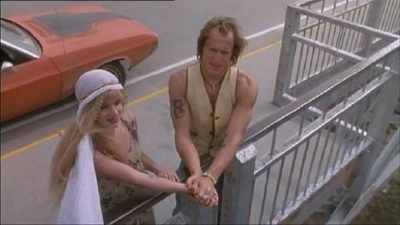
They’re cool, casual, confident and hot. They’re funny and obnoxious and unhinged. They’re the sexiest serial killers in the world. Say hello to Mickey and Mallory Knox.
Oliver Stone got a lot of heat for making this movie. And more than one psychotic couple has cited this movie as the inspiration for their own shooting spree. John Grisham tried to sue Oliver Stone for inciting violence. Quentin Tarantino wrote the script and then removed his name entirely from the film, which I don’t understand, because I’m not sure that Tarantino could have made this movie any better, himself.
A lot of people think this movie promotes senseless violence, but I disagree, wholeheartedly. This movie is a social commentary on the United States: the media and the phoniness stuffed down our throats at every turn. Are Mickey and Mallory psychotic? Yes. Are they evil? Maybe. But they weren’t born psychotic and evil. Stone tries to make it very clear that they are products of their environment.
Neither of them were killers when they met. But there is something about their love that sparks their endless killing spree. The first time Mickey kills is to protect Mallory—who symbolizes natural love. Then something is unleashed. “You’re free, Kevin.” They go on a rampage, killing people because at least murder is something real. And while they kill randomly, without remorse or empathy, all the other main characters in the film are worse.
The cop chasing them is just as psychotic as they are, the warden is a masochistic sociopath, and the journalist (Robert Downey Jr.) is a phony who represents everything wrong with America. The journalist is worse because, even though he doesn’t have blood on his hands (at least before the ending), he represents something more damaging and irreparable. He’s perpetuating the tenets of mindless passivity—to just put filler out for the lost generation out in T.V. land to sit back and watch.
In contrast to Robert Downey Jr’s phony character, is the Native American shaman who tries to help Mickey and Mallory, and who was not a part of the society that created and shunned them. Because of this polar separation from American society, he represents the only purity in this movie. It’s important to note that this is the only victim Mickey and Mallory regret killing, and that his murder was unintentional.
They eventually slay Robert Downey Jr’s character at the end of the movie, even though he helped them escape and had an “epiphany,” which was just as fake as everything else he represented. And maybe, just maybe, you could perceive Mickey and Mallory as agents of rightful retribution, wiping out all the fakeness they see around them, because there’s no other solution. Or maybe they’re just insane.
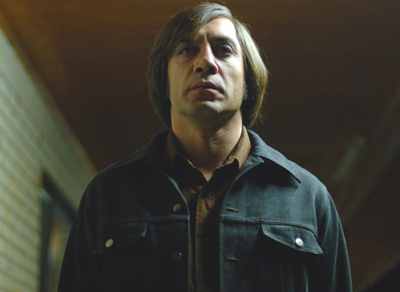
No Country for Old Men is a masterpiece. It’s easily one of the best movies made in the last ten years. And while the two other male leads in this movie played their roles so well that I found myself gripping (literally gripping) the theatre seats in anticipation of the ending, what truly makes this movie stand out as one of the best of all time is Javiar Bardem’s character: Anton Chigurh.
He’s a vicious, cold-blooded psychopath with a bad haircut who murders everything in his path on his way from point A to point B. On the surface it might appear that he’s after money, or that he enjoys killing, but he’s really just an avenger, avenging every mistake ever made on earth. He doesn’t care whether or not his victims are specifically responsible. He’s not a cause, but a byproduct of the new evilness hinted at by the sheriff and the title of the film. He’s the embodiment of retribution and death, killing the majority of people who have the misfortune to cross his path.
He kills out of some purpose we aren’t ever shown, and has morals that we can sense but can’t really imagine. But while his other-worldliness should create a distance between himself and the audience, it is contrasted by these regular human actions, like eating a bag of peanuts while he’s deciding whether or not to kill an innocent (or is he only innocent by how we see things?), gas-station owner, or drinking a bottle of milk inside Llewelyn’s trailer, Into which he has just broken to murder everyone inside. He is human, which we can forget. He can be hurt. He gets shot and he bleeds and cringes and limps just like anyone else would. He’s not from another planet.
And he’s comedic in some way only the Cohen Brothers could have invented: this dry, matter-of-fact, awkwardly candid, honest humor that’s so bewildering and hypnotizing that we’re not even sure if it’s funny, or even whether it was meant to be. It’s this contrast that makes him so accessible. Not to mention he’s super bad-ass, self-sufficient, intelligent, cool, and he uses probably the most bad-ass weapon in any movie, ever.
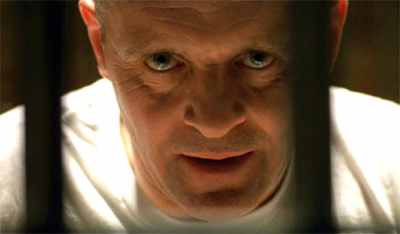
Of course Dr. Lecter had to be #1 on this list. Throughout three movies he dazzled us with his charm and wit. In Silence of the Lambs, we heard about his vile crimes before we ever met the man. And, at first, we might have believed that Hannibal was just a kindly old man, trapped in a brick cell for crimes that sounded a little too exaggerated. But very soon we see that isn’t the case at all. His creepiness and power are cerebral. Within minutes of meeting her he puts dainty Clarice Starling on her psychological ass (“You know what you look like to me with you good bag and your cheap shoes, you look like a rube”) His murders are some of the most violent, and yet he remains sophisticated and respectable, no matter how deranged his actions. Not only does he have a svelte, hypnotic voice that manipulates victims and other serial killers alike, he is also the most intelligent and classy serial killer we’ve ever met.
While Mickey and Mallory Knox might dine on some greasy breakfast food at a truck-stop, our dear Hannibal requires nothing less than the finest caviar and Chianti to be found anywhere in the world. Whether cutting off guard’s faces, feeding an out-of-tune violinist to a table of aristocrats, getting one of his patients to cut off his own face and feed it to his dogs, or biting off a nurse’s tongue while his heartbeat remains under 85 beats a minute, Dr. Lecter remains a true gentleman to the end, not killing good people unless he has to, and cutting off his own hand instead of Clarice’s—his muse—when push comes to shove.
And just as we can see the progression of affection our dear Clarice feels for this man (although she would never admit it) we, too, become paralyzed by his charm, even knowing all that we know. Detective Will Graham called him insane, and he probably is—must be—but a part of all Hannibal’s fans realize how thin the line between genius and insanity really is.
Honorable Mentions: Leon (The Professional), Ryan Gosling (Murder By Numbers), Travis Bickle (Taxi Driver), Dennis Hopper (Out of the Blue and Blue Velvet), Benicio Del Toro (21 grams).








